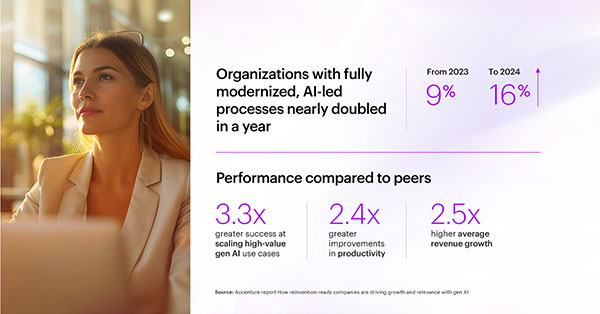AI is key to future growth but businesses must address data modernization, talent reinvention and collaboration to fully scale generative AI.
By Laura Peterson, the Americas Market Lead of Accenture Operations
The promise of artificial intelligence (AI) to revolutionize business operations is undeniable. Yet, despite the growing push to implement AI throughout organizations, the reality is stark: most businesses are struggling to evolve the way they operate. This disconnect is not just a technical issue—it’s a strategic one.
Accenture’s recent research, which surveyed 2,000 senior executives across 15 industries and 12 countries, paints a sobering picture. Over 60% of executives say their data assets are not ready for generative AI, and nearly 80% feel their organization’s training efforts are struggling to keep pace with the rapid advances in AI.
As AI capabilities continue to evolve, companies that fail to adopt and integrate these technologies effectively risk becoming obsolete. So, what separates those organizations that are succeeding from those that are lagging? The answer isn’t just in having the latest AI tools—it’s in how they integrate AI into their operations. According to Accenture’s Pulse of Change, more than half of C-suite leaders plan to allocate more funds toward generative AI compared to traditional AI.
The key to scaling AI success lies in developing what we call intelligent operations. With intelligent operations at the heart of the enterprise, a company can become more flexible, agile, and responsive; generate value more quickly; and achieve a sustainable competitive advantage. This concept is more than just implementing the latest technologies; it’s about rethinking and redesigning business processes to leverage AI, data, automation, and analytics at scale. The companies that have achieved this transformation have achieved staggering results: 2.5 times higher revenue growth, 2.4 times greater productivity, and 3.3 times more success in scaling generative AI use cases.
Yet, this level of success is not automatic. It requires a shift in how companies view AI—not as an add-on, but as a fundamental enabler of business reinvention. So, if businesses are to thrive in this new AI-powered era, leaders must take action in four critical areas.

A key enabler of successful AI adoption is strong data governance. According to Accenture research, over one-third of organizations with operational maturity prioritize centralizing data governance, ensuring fast, reliable access to high-quality data. This is crucial for AI initiatives, as well-organized data allows AI to drive meaningful insights and automation. Companies that modernize their data governance systems are better positioned to enhance productivity, seize new opportunities, and stay agile in a fast-moving world. By treating data as a strategic asset, organizations can unlock the full potential of AI and maintain a competitive edge.
AI will change the business, but it will also change the workforce. There is no greater mistake a leader can make than viewing talent as a secondary consideration in their AI strategy. Yes, technology is important—but the real impact of AI comes from how it intersects with people. Reinvention of the workforce is essential.
A staggering 92% of organizations that are succeeding with AI say that their talent is ready for tech-led reinvention. In our experience, organizations that have a well-defined talent strategy, addressing everything from workforce planning to upskilling, are better positioned to reinvent. The key is not just hiring new talent but redefining existing roles and fostering a culture of continuous learning. Too many companies are failing to invest in this transformation, choosing instead to hire the “AI-ready” worker from the outside. That’s a short-sighted approach.
A true talent-first strategy requires companies to acknowledge the necessity of continual upskilling—employees must grow alongside the technology.
AI is a business strategy, not a technology project. Yet too many organizations still treat it as the latter. In organizations with a high level of operational maturity, 87% of leaders report that the most successful AI initiatives are those in which business and tech teams collaborate extensively. This isn’t just a tactical consideration—it’s a cultural shift.
For business leaders aiming for successful, large-scale AI transformation, active and full investment in the process is essential. AI thrives when there is strong collaboration between business and technology teams, with both sides aligned to strategic goals. When leaders ensure that AI initiatives are integrated across the organization, they unlock the true potential of technology to drive meaningful change and achieve long-term success.
The truth is, AI is not a plug-and-play solution. It needs to be contextualized within the business strategy, and this requires input from both business and technology teams. This co-ownership model accelerates innovation, minimizes friction, and ensures that AI isn’t just a buzzword but a critical lever in achieving business success.
In the rush to adopt AI, many organizations overlook the importance of process optimization. But those who succeed with AI are the ones who apply leading processes—using cloud-based practices, benchmarking, and continuous monitoring to identify gaps and inefficiencies. Only then can they make intelligent decisions about how to leverage AI to improve outcomes.
It’s not enough to deploy AI tools; companies must be vigilant about tracking performance, iterating on processes, and ensuring that AI solutions are continuously aligned with organizational goals. The businesses that are thriving in this new age are those that understand the importance of agility. They don’t just deploy AI; they optimize it.
As businesses race toward a future that will be wildly different from today, they are quickly recognizing that operations readiness is a key to thriving in this new world. Looking ahead, companies will need to embrace ever more profound reinventions to develop sustainable, mature business operations, powered by generative AI. The organizations that get it right will see profound impacts on their future growth, productivity, and profitability.

About the Author:
Laura Peterson is a Senior Managing Director and the Americas Market Lead of Accenture Operations. She works with clients to deliver sustainable growth and competitiveness through strategic managed services across industries.
Before assuming her current position in 2024, Laura managed a client portfolio of the world’s most recognizable brands in communication, media and technology. In her prior 24 years with Accenture, she has also played a number of leadership roles across the company in Retail, Life Sciences, Industrial, Mining and Consumer Goods.
Scott Ellyson, CEO of East West Manufacturing, brings decades of global manufacturing and supply chain leadership to the conversation. In this episode, he shares practical insights on scaling operations, navigating complexity, and building resilient manufacturing networks in an increasingly connected world.